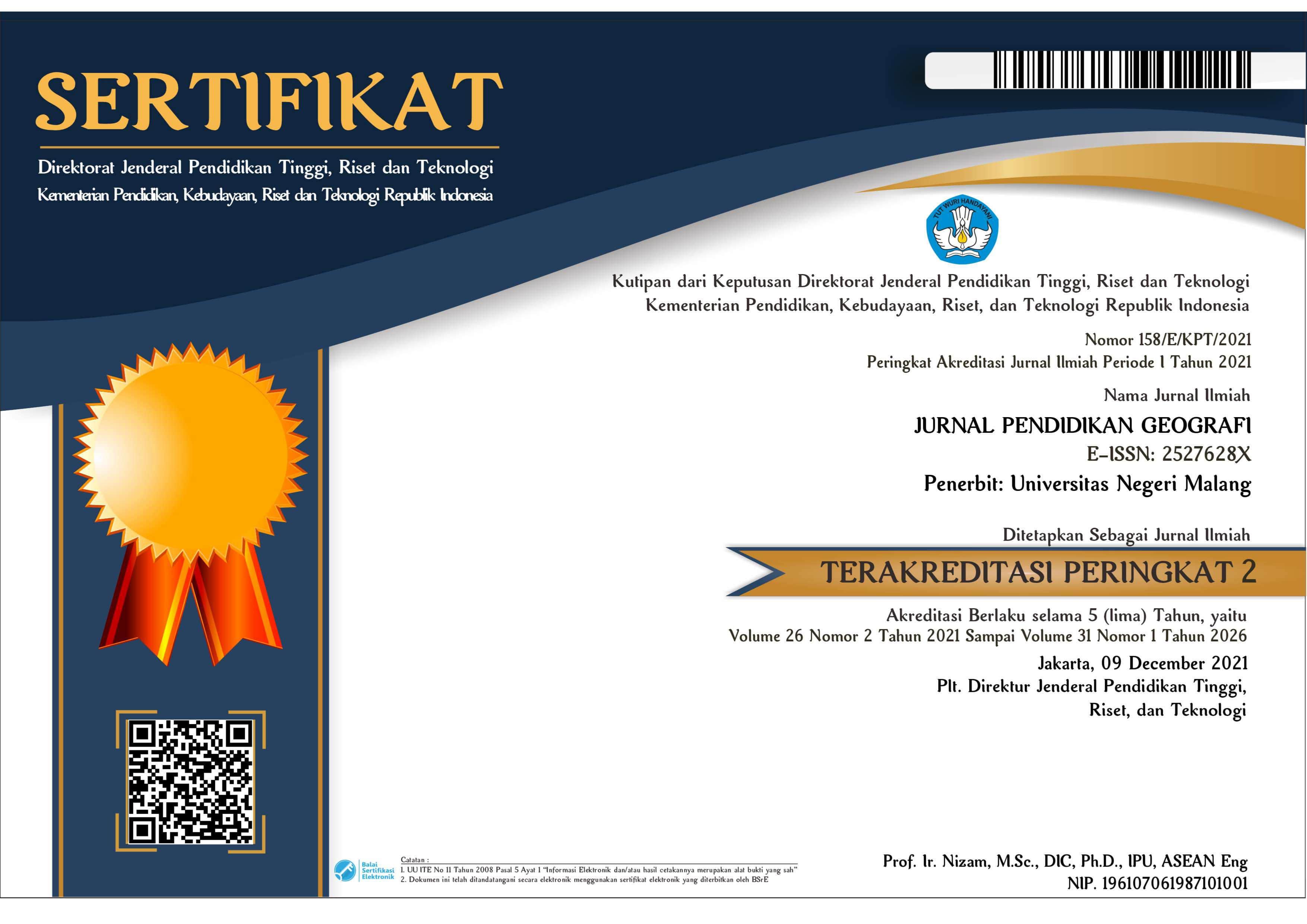Teachers need analysis: Development of the Urban Heat Island module based on a contextual approach
Abstract
Since the nineteenth century, scientists have studied the Urban Heat Island (UHI). The negative effects of UHI could be mitigated with the help of interdisciplinary studies, but none have been performed so far. UHI research in schools has some holes that could seriously hinder students' grasp of climate change. The purpose of this research is to ascertain whether or not the Urban Heat Island module is necessary for enhancing students' understanding of climate change in the classroom. The Greater Solo Area Region's 72 geographic teachers were chosen at random for this study. Preliminary data on teachers' familiarity with UHI in the Greater Solo Area shows that, on average, they know very little about UHI. About 47 percent of the teachers surveyed had no understanding at all of UHI, while the remaining 25 percent had a moderate amount of knowledge, seven percent had high understanding, and three percent had very high understanding. Results from a test given to educators in both the suburbs and the city corroborated these observations. All teachers agreed that the UHI enrichment module created using a contextual approach was necessary as a supplementary medium for climate change material, as indicated by the results of the teacher needs assessment tests.
Keywords
Full Text:
PDFReferences
Abulibdeh, A. (2021). Analysis of urban heat island characteristics and mitigation strategies for eight arid and semi-arid gulf region cities. Environmental Earth Sciences, 80(7), 1–26. https://doi.org/10.1007/s12665-021-09540-7
Anderson, T. R., Hawkins, E., & Jones, P. D. (2016). CO2, the greenhouse effect and global warming: from the pioneering work of Arrhenius and Callendar to today’s Earth System Models. Endeavour, 40(3), 178–187. https://doi.org/10.1016/j.endeavour.2016.07.002
Aram, F., Solgi, E., Garcia, E. H., & Mosavi, A. (2020). Urban heat resilience at the time of global warming: evaluating the impact of the urban parks on outdoor thermal com-fort. Environmental Sciences Europe, 32(1). https://doi.org/10.1186/s12302-020-00393-8
Ariefiani, Z., Kustono, D., & Pathmantara, S. (2016). Module development with pro-ject-based learning approach and assure development model. AIP Conference Proceedings, 1778(October 2016). https://doi.org/10.1063/1.4965770
Baroroh, N. (2017). Land Cover and Density Vegetation Changes Of Urban Heat Is-land In Surakarta City. 641–652.
Chapman, S., Watson, J. E. M., Salazar, A., Thatcher, M., & McAlpine, C. A. (2017). The impact of urbanization and climate change on urban temperatures: a systematic review. Landscape Ecology, 32(10), 1921–1935. https://doi.org/10.1007/s10980-017-0561-4
Corner, A., Roberts, O., Chiari, S., Völler, S., Mayrhuber, E. S., Mandl, S., & Mon-son, K. (2015). How do young people engage with climate change? The role of knowledge, values, message framing, and trusted communicators. Wiley Interdisciplinary Reviews: Cli-mate Change, 6(5), 523–534. https://doi.org/10.1002/wcc.353
Darmiatun, S. (2013). Menyusun Modul, Bahan ajar untuk Persiapan Guru dalam Mengajar. Jogjakarta: Gava Media.
Demaidi, M. N., & Al-Sahili, K. (2021). Integrating sdgs in higher education—case of climate change awareness and gender equality in a developing country according to rmei-target strategy. Sustainability (Switzerland), 13(6). https://doi.org/10.3390/su13063101
Fawzy, S., Osman, A. I., Doran, J., & Rooney, D. W. (2020). Strategies for mitiga-tion of climate change: a review. Environmental Chemistry Letters, 18(6), 2069–2094. https://doi.org/10.1007/s10311-020-01059-w
Heaviside, C., Macintyre, H., & Vardoulakis, S. (2017). The Urban Heat Island: Im-plications for Health in a Changing Environment. Current Environmental Health Reports, 4(3), 296–305. https://doi.org/10.1007/s40572-017-0150-3
Iqbal, M., & Basuki, Y. (2017). Dynamics of Urban Growth in Surakarta Urban Ar-ea. 609–618.
Kotharkar, R., Ramesh, A., & Bagade, A. (2018). Urban Heat Island studies in South Asia: A critical review. Urban Climate, 24(October 2017), 1011–1026. https://doi.org/10.1016/j.uclim.2017.12.006
Leal Filho, W., Wolf, F., Castro-Díaz, R., Li, C., Ojeh, V. N., Gutiérrez, N., … Bönecke, J. (2021). Addressing the urban heat islands effect: A cross-country assessment of the role of green infrastructure. Sustainability (Switzerland), 13(2), 1–20. https://doi.org/10.3390/su13020753
Lee, K., Kim, Y., Sung, H. C., Jang, R., Ryu, J., & Jeon, S. W. (2020). Trend analy-sis of urban heat island intensity according to urban area change in Asian mega cities. 40th Asian Conference on Remote Sensing, ACRS 2019: Progress of Remote Sensing Technolo-gy for Smart Future.
Liu, S., Roehrig, G., Bhattacharya, D., & Varma, K. (2015). In-Service Teachers’ Attitudes, Knowledge and Classroom Teaching of Global Climate Change. Science Educator, 24(1), 12–22.
Maria, B. A.-, Ionut, D. M., Iasmina, K. A., Ștefana, B., Stelian, M., & Gabriela, P. (2016). Urban heat island - state of the art review. (November).
Masumoto, keiko. (2015). Urban Heat Islands. In Environmental Indicators (pp. 1–1068). https://doi.org/10.1007/978-94-017-9499-2
Nigatu, T. (2017). Experience of the Integrated Family Health Program ( IFHP ) Peer Educators as Agents of Change ; (January). https://doi.org/10.13140/RG.2.2.31263.36002
PISA. (2019). PISA 2018 Assessment and Analytical Framework. https://doi.org/10.1787/b25efab8-en.
Puteh, M., N, C. A. C., N, M. N., Adnan, M., & Ibrahim, M. H. (2015). The Class-room Physical Environment and Its Relation to Teaching and Learning Comfort Level. 5(3), 3–6. https://doi.org/10.7763/IJSSH.2015.V5.460
Putri, M. A., Rahayu, M. J., & Putri, R. A. (2016). Bentuk Morfologi Kawasan Permukiman Urban Fringe Selatan Kota Surakarta. Jurnal Pengembangan Kota, 4(2), 120. https://doi.org/10.14710/jpk.4.2.120-128
Sen, S., & Khazanovich, L. (2021). Limited application of reflective surfaces can mit-igate urban heat pollution. Nature Communications, 12(1), 1–8. https://doi.org/10.1038/s41467-021-23634-7
Seroussi, D.-E., Rothschild, N., Kurzbaum, E., Yaffe, Y., & Hemo, T. (2019). Teachers’ Knowledge, Beliefs, and Attitudes about Climate Change. International Education Studies, 12(8), 33. https://doi.org/10.5539/ies.v12n8p33
Stevenson, R. B., Nicholls, J., & Whitehouse, H. (2017). What Is Climate Change Education? Curriculum Perspectives, 37(1), 67–71. https://doi.org/10.1007/s41297-017-0015-9
Stewart, I. D. (2019). Why should urban heat island researchers study history? Ur-ban Climate, 30(April), 100484. https://doi.org/10.1016/j.uclim.2019.100484
Sugiyono. (2017). Metode Penelitian Pendidikan, Pendekatan kuantitatif, dan R&D (Cetakan Ke). Bandung, Indonesia: Alfabeta.
Sulistyawati, S., Mulasari, S. A., & Sukesi, T. W. (2018). Assessment of knowledge regarding climate change and health among adolescents in Yogyakarta, Indonesia. Journal of Environmental and Public Health, 2018. https://doi.org/10.1155/2018/9716831
Susilawati, siti azizah. (2016). Pengenalan urban Heat Island pada Peserta Didik se-bagai Upaya Mitigasi Bencana Klimatologid di Kota Surakarta. Retrieved from http://alptkptm.org/prosiding-profunedu/
UNESCO. (n.d.). climate change education for Sustainable Development.
Williams, C., Fenton, A., & Huq, S. (2015). Knowledge and adaptive capacity. Na-ture Climate Change, 5(2), 82–83. https://doi.org/10.1038/nclimate2476
Zhou, D., Xiao, J., Bonafoni, S., Berger, C., Deilami, K., Zhou, Y., … Sobrino, J. A. (2019). Satellite remote sensing of surface urban heat islands: Progress, challenges, and perspectives. Remote Sensing, 11(1). https://doi.org/10.3390/rs11010048
DOI: http://dx.doi.org/10.17977/um017v28i12022p14-24
Refbacks
- There are currently no refbacks.
Copyright (c) 2023 Jurnal Pendidikan Geografi: Kajian, Teori, dan Praktek dalam Bidang Pendidikan dan Ilmu Geografi

This work is licensed under a Creative Commons Attribution-ShareAlike 4.0 International License.
Jurnal Pendidikan Geografi: Kajian, Teori, dan Praktek dalam Bidang Pendidikan dan Ilmu Geografi is licensed under Creative Commons Attribution-ShareAlike 4.0 International License,
JPG Indexed By:
View My Stats








12.png)
